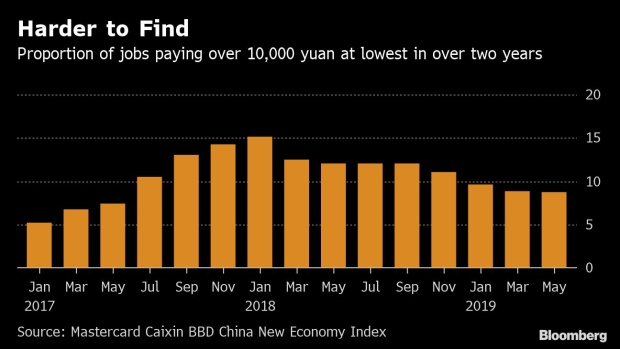Jul 11, 2019
Next China: Downright Daunting
, Bloomberg News

(Bloomberg) -- Want this post delivered to your inbox every Friday? Sign up for Next China.
Managing China’s $13.6 trillion economy was a less than enviable task before the trade war. Now it's downright daunting.
U.S. tariffs are an obvious challenge. They’ve eroded American demand for Chinese exports and left many of the factories that produce those goods in danger of shutting. And while there's a truce and negotiators are talking again, a quick deal seems unlikely.
As Beijing considers how to cushion the blow from trade, it'll also have to weigh the country's other major challenge: debt. China’s total debt surged to 271% of gross domestic product last year, from 164% before the global financial crisis, according to estimates by Bloomberg Economics. That’s left officials wary of rolling out any broad-based stimulus.
On Monday, we’ll get an update of how well policy makers have managed those challenges when China releases GDP data for the second quarter. Economists are expecting growth to have slowed to 6.2% from 6.4% in the previous quarter.
Expansion at 6.2%, even though it’d be the slowest in more than two decades, is something Beijing should find acceptable. It’s well within China’s official target for this year of between 6% to 6.5% growth.
But there are clouds on the horizon. The truce presidents Donald Trump and Xi Jinping shook on in Japan is no guarantee that the two sides strike a deal. And if they don’t, U.S. tariffs on another $300 billion of Chinese imports could well be on their way.
That’s not a blow China’s economy appears ready to shrug off. Data for June showed that manufacturing activity contracted for a second consecutive month. A report on Chinese factory prices this week revealed that they'd fallen to just shy of deflation.
All that uncertainty is sure to keep policy makers in Beijing burning the candle at both ends.
Beyond Trade
Tensions in China's relationship with the U.S. haven't been limited to trade. This week, the U.S. State Department's decision to approve the sale of a $2 billion package of arms to Taiwan sparked a strong rebuke from Beijing. Meanwhile, Hong Kong media tycoon and outspoken China critic Jimmy Lai visited Washington, where he got a welcome that rankled Beijing. Lai's trip included meetings with National Security Adviser John Bolton, Vice President Mike Pence and Secretary of State Mike Pompeo, the sort of hospitality usually reserved for the most-senior dignitaries.
Hong Kong
In Hong Kong, Chief Executive Carrie Lam declared that the city's controversial extradition bill was "dead." What she didn't say was that the bill had been withdrawn, which is what local demonstrators have demanded and why protest leaders responded to Lam's remarks with a vow to return to the streets. That's not good news for business, which is starting to feel the affects. Protesters this week began calling on advertisers to pull commercials from the city's largest broadcaster, claiming that Television Broadcasts Ltd.'s coverage of the demonstrations has been biased.
Police Custody
More also emerged this week about the circumstances surrounding the detention of Camsing International's chairwoman. Shares of the Hong Kong-listed company plunged after it revealed police in Shanghai had taken Chairwoman Lo Ching into custody. What the company didn't explain was why she'd been detained. Noah Holdings, one of China's largest wealth managers, followed with a statement saying one of its funds had lent money to companies related to Camsing and that Lo had been detained in connection with suspected fraudulent activity.
Venture Capital
Meanwhile, there are signs that a boom in venture capital investing in China may be coming to an end. New data from research firm Preqin showed the amount of money invested in the second quarter fell 77% from a year earlier to $9.4 billion, while the number of deals halved. Some companies are still raising money. One example is Meicai, a Chinese start up that connects vegetable farmers with restaurants, which this week began looking to secure at least $500 million at a valuation of between $10 billion to $20 billion.
Out of School
And finally, Chinese universities will be graduating more than 8 million students this summer. Unfortunately, it's not the greatest job market to be entering thanks to slowing growth and the ongoing trade war, even for those earning degrees from the country's most-prestigious institutions. The solution some are choosing is to either delay their graduation or to opt for a gap year. Why? They believe the worst will pass.
To contact Bloomberg News staff for this story: John Liu in Beijing at jliu42@bloomberg.net
To contact the editor responsible for this story: Sharon Chen at schen462@bloomberg.net
©2019 Bloomberg L.P.